| Srl | Item |
| 1 |
ID:
111636
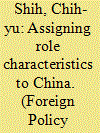

|
|
|
|
|
| Publication |
2012.
|
| Summary/Abstract |
This paper distinguishes and integrates national identity and national image through a deep role analysis. It argues that the meaning of China's rising rests upon the views of those who evaluate China's role playing. This role analysis mediates between international relations and Chinese foreign policy. It also mediates between China watchers and their China. The two dimensions of role-role taking and role making-generate four different discursive approaches to interpreting the rise of China, each in its own way associated with the affects of opportunity and threat. They are "nation state,""civilization,""Tianxia," and "Asianism." In response to the external view on the rise of China, Chinese narrators often take the Tianxia and nation state approaches as components of their conception of national role. These conceptions mediated by role-making and role-taking, evolve into four possible strategic focuses-national interests, imperialism, sovereignty and center-periphery. While this last strategic focus on role-taking has recently attracted enthusiastic response in China, it has been re-appropriated by social science concepts such as soft power and social capital that assume an egoistic role-making China is on the move.
|
|
|
|
|
|
|
|
|
|
|
|
|
|
|
|
| 2 |
ID:
111635


|
|
|
|
|
| Publication |
2012.
|
| Summary/Abstract |
The paper suggests a dialogue between role theory and foreign policy learning literature. I argue that role theory, when conceptualized in the interactionist tradition of George Herbert Mead, can contribute analytical clarity to the literature on policy learning. By specifying role theory to account for various modes of "role taking," the constitutive social effects of individual or organizational learning for a given community become apparent. Furthermore, an interactionist reading of role theory advances the concept of "role taking" by complementing it with "role making." While the former connects societal expectations and individual or collective self-expectations and behavior, the later conceives learning as the interaction between individual creativity and societal expectation in the process of "as-if role taking." The illustrative cases of role making and taking reveal the creative effects of role making while accounting for the constraining impact of institutions and communal expectations. I conclude that role theory and (foreign policy) learning are powerful explanatory tools, but only if they are integrated to bridge the gap between agent and structure.
|
|
|
|
|
|
|
|
|
|
|
|
|
|
|
|
| 3 |
ID:
111637
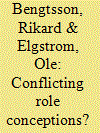

|
|
|
|
|
| Publication |
2012.
|
| Summary/Abstract |
This article utilizes role theory for analysing the role(s) of the European Union (EU) in global politics. Specifically addressing the interplay of the EU's own role perception and the role expectations held by other actors, the article contributes two case studies of the role(s) of the EU in relation to two important but different actor groupings-Eastern Europe including Russia and the ACP countries in the developing world, respectively. The analysis points to the tensions that exist between self-perceptions and the perceptions of the EU's counterparts in Eastern Europe and the developing world, and how these tensions influences the interaction between the actors.
|
|
|
|
|
|
|
|
|
|
|
|
|
|
|
|
| 4 |
ID:
111633
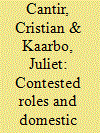

|
|
|
|
|
| Publication |
2012.
|
| Summary/Abstract |
Many of the strengths of research in Foreign Policy Analysis have been overlooked by role theorists. Role theorists often assume that roles are shared across elites and masses, that elites can manipulate masses, or that public opinion on roles constrains elites. Role theorists also tend to assume that there is a consensus among elites over national roles. Research in Foreign Policy Analysis, on the other hand, demonstrates that foreign policy may be contested both vertically (between elites and masses) and horizontally (among elites) and that these conflicts affect foreign policy decision making and foreign policy behavior. We propose that (i) contested roles mean that roles and foreign policy are not as stable as is often implied; (ii) research on contested roles offers Foreign Policy Analysis a less preference-oriented way of conceptualizing policy disagreements and decision making; and (iii) structures reveal themselves as important when agents use them in domestic discourse over contested roles, but the impact of international norm and role structures is not automatic, as it is shaped by the agents (and domestic structures) in the domestic political process. We suggest that research on the strategic use of roles could bring together these benefits of examining contested roles.
|
|
|
|
|
|
|
|
|
|
|
|
|
|
|
|
| 5 |
ID:
111632
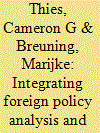

|
|
|
|
|
| Publication |
2012.
|
| Summary/Abstract |
We argue that role theory offers the possibility of integrating Foreign Policy Analysis (FPA) and International Relations (IR) theory. While role theory was originally adapted for use by U.S.-based FPA scholars, it was later picked up by European scholars as well as the Constructivist IR community. The ISA Workshop that generated this special journal issue was designed to bring together scholars from these various research traditions to pursue integration and synthesis. The resulting papers contained in this issue have set the stage for a productive conversation that has continued well beyond the initial workshop. Role theory does appear to offer the possibility of integration and even synthesis across FPA and IR as demonstrated in the following papers. We believe that this special issue highlights numerous avenues to continue the fruitful development of this research program.
|
|
|
|
|
|
|
|
|
|
|
|
|
|
|
|
| 6 |
ID:
111634
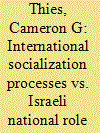

|
|
|
|
|
| Publication |
2012.
|
| Summary/Abstract |
This paper develops a theoretical approach to state socialization grounded in role theory. Role theory, in particular the role location process, offers a way to connect grand International Relations theory and inquiry to the analysis of specific foreign policy actions through the socialization concept. The role location process is presented as a stylized socialization "game" that models the interaction of a state, its socializer(s), and the interested audience as it reacts to cues and demands. This model is then applied to several episodes of early Israeli history (1948-1956) covering the emergence of the sovereign state through its achievement of small state status in the aftermath of the Suez Crisis.
|
|
|
|
|
|
|
|
|
|
|
|
|
|
|
|